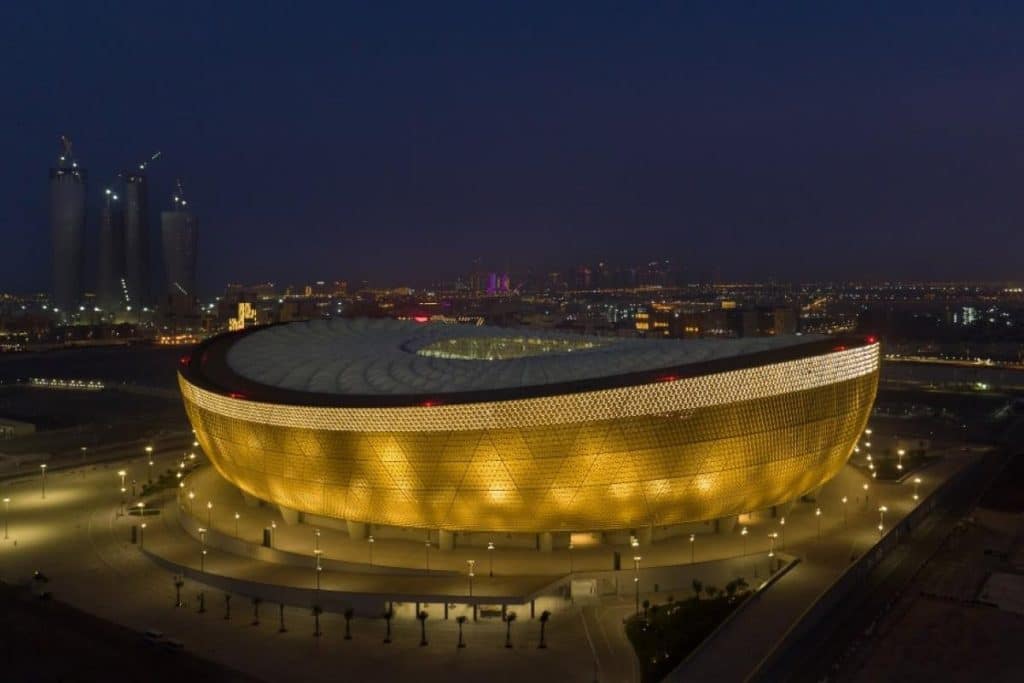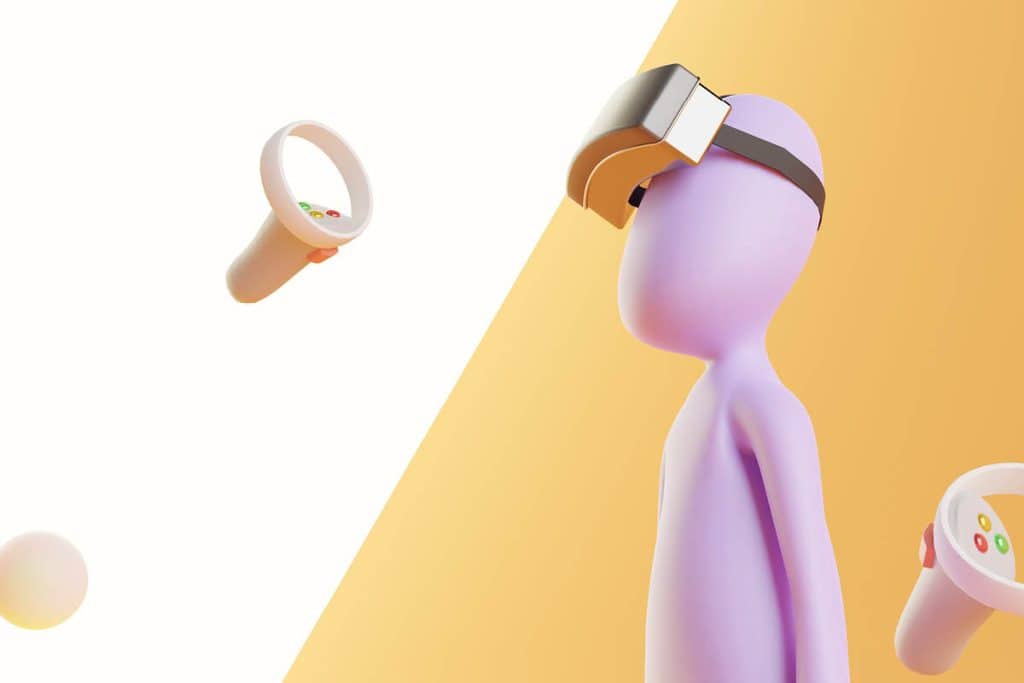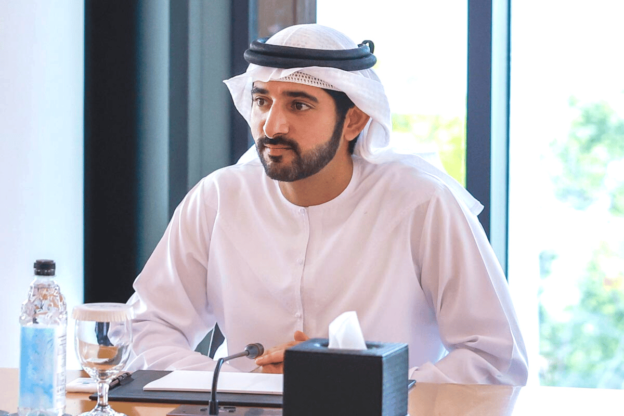Sheikh Hamdan approved the new phase of the Dubai Metaverse Strategy, which will implement measures to empower the use of the metaverse and future technologies
The emergence of Web 3 and the metaverse will have “endless” possibilities of how it could impact industries and communities in the UAE, experts told the Arabian Business UAE Forum.
According to David Zennie, chief executive officer of Disruptive, the metaverse could allow us to create new worlds and redefine how business is done – a major pivot from the “transactional” nature of Web 2, or the internet as we know it now.
The UAE has grown in potential in becoming a hub for both talent and innovation in the space.
Dubai is taking a further step into the metaverse after Sheikh Hamdan approved a new strategy to enhance the digital economy.
Sheikh Hamdan bin Mohammed bin Rashid Al Maktoum, Crown Prince of Dubai, Chairman of The Executive Council of Dubai, and Chairman of Dubai’s Higher Committee of Future Technology Development and Digital Economy, approved the new phase of the Dubai Metaverse Strategy, which will implement measures to empower the use of the metaverse and future technologies.
Dubai aims to be a global top 10 metaverse economy and an investment hub for the developing sector.
Dubai metaverse plan
In approving the new phase of the emirate’s metaverse strategy, Sheikh Hamdan has set up a 100-day plan for government organisations to co-ordinate their contributions to the development of the digital economy
Sheikh Hamdan said that the emirate is set to become one the world’s top digital economies and a leading platform for innovations that can shape the future.
“Through this Committee, we seek to develop a new model for the development of technology and futuristic sciences with a special focus on digital technologies and the metaverse as part of our broader strategy to promote digital growth and innovation and achieve the goals of the Dubai Metaverse Strategy,” said Sheikh Hamdan.

In updating the Dubai Metaverse Strategy he approved four key strategies aimed at using metaverse technologies to provide government services and a comprehensive study aimed at identifying the social benefits of introducing metaverse services that will be submitted to The Executive Council for approval.
The initiatives also seek to build the skills of talented Emiratis and create a large metaverse community in the city that includes metaverse companies, start-ups, investors and users.
The initiatives also include strategic projects featuring partnerships with private sector players and events aimed at making Dubai a hub for regional and global metaverse-related events.
Last July, Sheikh Hamdan launched the metaverse strategy as the emirates plans to turn the region into one the world’s top 10 metaverse economies as well as a global hub for the metaverse community.
The Strategy aims to build on the city’s achievement of attracting more than 1,000 companies in the fields of blockchain and metaverse.
It also promotes the emirate’s ambitions to support more than 40,000 virtual jobs by 2030.
This is set to further boost the UAE economy and support the UAE government’s vision of increasing the number of blockchain companies by five times the present number.

The Dubai Metaverse Strategy focuses on four sectors:
- tourism,
- education,
- government services and
- retail & real estate.
A tourism task force will be launched by the UAE for the metaverse, to enhance the tourism industry.
The Ministry of Economy also announced a service centre on the metaverse, aimed to enhance virtual government services.
Dubai is also introducing the city’s digital twin in the metaverse, to simulate actions and decisions virtually before bringing it to reality, enhancing the retail and real estate sector.
Here’s a summary of all the latest metaverse trends and announcements from recent months:
- UAE now home to world’s first metaverse-as-a-service business
- Arab Health to showcase $5 billion healthcare metaverse market
- Qatar World Cup: Lusail Stadium launched in metaverse as fans snap up FIFA 2022 merchandise
- UAE offers metaverse, AI and blockchain training to make employees more productive
- Brands need to engage with the Metaverse and NFT or risk losing to competition
- UAE’s Pickl lets visitors in the metaverse order a burger virtually and eat it physically
- Nike opening .Swoosh store to sell trainers in metaverse after $200m NFT success
- Dubai to open world’s first metaverse nightclub
UAE now home to world’s first metaverse-as-a-service business
The UAE is set to witness the next stage in metaverse development, with the Singapore-based Metapolis, which claims to be the world’s first ‘metaverse-as-a-service’ (MaaS) venture – a la SaaS for web2 companies – making an entry with its ambitious plans to handhold businesses from across sectors to the virtual world.
The Metapolis’ MaaS platform will roll out an end-to-end service to rope in all economic sectors in the UAE and the larger GCC region to help them create new business insights and revenue streams, besides expanding their customer and client interactions to the virtual world.

The metaverse is currently largely associated with arts, sportswear, real estate and fashion retail, though more sectors such as healthcare are taking baby steps to make their presence in the fast expanding virtual world.
“If SaaS (software-as-a-service) has emerged as the well-established business model to dominate the web2 space, the coming transition to web3 will undoubtedly see a similar market opportunity for MaaS businesses,” Sandra Helou, co-founder and chief commercial officer at Metapolis, told Arabian Business.
“And we are proud to be first-movers in this domain,” she said.
As part of Metapolis’ aggressive plans in the UAE and the larger region, the Singapore-based startup announced last week plans to set up its international headquarters in Dubai.
Helou said the UAE – as also the GCC region – has been tremendously accommodating to the web3 community and so the decision to set up an HQ in Dubai was very natural.
“The networking opportunities [in the region] with government entities, other startups, and even large-scale multinational technology companies are huge. Our market research very much agrees with the general consensus that the UAE is the main hub for blockchain and web3 for the foreseeable future,” she said.
Helou said the metaverse is extremely malleable, and that is the reason it can be applied to so many different sectors and business models.
“Our role is to facilitate this inclusion for these sectors by breaking down barriers to entry and being thought and action leaders in this domain,” she said.
Helou said the company’s vision is to bridge the gap between the physical and digital worlds through seamless integration and an always-on layer of engagement.
“Metapolis has its sights set on becoming ‘The Next Internet’ and building a future for interoperability with security, safety and digital identity at heart,” she said.
Helou said Metapolis would guide clients on the entire range of services – from ideation to metaverse deployment and build.

She also said the startup has already signed up with some of the biggies in the GCC region – either currently operating or moving into the region – to make them metaverse-ready.
“We have a couple of announcements that will be going out in regards to the clients and closed partnerships. Unfortunately, due to NDAs (non-disclosure agreements) we cannot go into full detail of the partnerships before they are announced,” Helou said.
The Metapolis top executive also revealed the venture’s plans for launching a few new products for the UAE-GCC region.
“One offering we have up and coming [for the region] is the first themed and gamified microverse to be launched called MGenesis. This product will offer 5,000 combined land and dome parcels for users to acquire which will yield incentivization and a gamification between holders with VIP utility and more,” Helou said.
She said Metapolis, which currently operates in the US, Europe and Asia, also has plans to expand its physical presence to other countries in the GCC region, though no time frame has been fixed for it yet.
Arab Health to showcase $5 billion healthcare metaverse market
Arab Heath with the newly launched Intelligent Health Pavilion will outline the most innovative and sustainable healthcare technologies through live demonstrations. The demonstrations will take place at the Future Health Summit in the Museum of the Future, exploring healthcare in the metaverse.
The Intelligent Health Pavilion will feature three demonstration rooms showcasing several new technologies through live demonstrations including a digital Intensive Care Unit (ICU), an intelligent operating room and emergency room.
The new feature will also include a seminar theatre and provide a platform for exhibitors to reveal the latest cutting-edge healthcare technology.

“The healthcare industry has witnessed incredible changes in recent years, with technology and innovation the driving force behind how the industry is elevating patient care. These latest advancements are expected to increase further by utilising the metaverse and looking at how we interact with technology to utilise artificial intelligence (AI), augmented reality (AR) and virtual reality (VR) to improve patient outcomes.” said Ross Williams, Exhibition Director for Informa Markets.
According to a report titled Healthcare in the Metaverse from Market Research Future, the healthcare metaverse market is predicted to grow at a Compound Annual Growth Rate (CAGR) of 48.3 percent until 2030, with the industry’s value expected to top $5.37 billion.
“The Future Health Summit is dedicated to trailblazers. From AI and robotics to the role of the metaverse, the healthcare industry is continuously evolving. A result of cutting-edge technology combined with innovative leaders committed to improving patient outcomes,” Williams added.
“The metaverse is expected to disrupt healthcare and open new channels of treatment while lowering costs. The predicted growth within this market is huge, and we’ve only explored the tip of the iceberg. The Future Health Summit will provide an invaluable look at how everyone in the healthcare industry can maximise what it offers,” he explained.
The upcoming Future Health Summit is set to take place in January 2023, the event will be supported by a host of government entities, including the UAE Ministry of Health and Prevention, the Government of Dubai, the Dubai Health Authority, the Department of Health, and the Dubai Healthcare City Authority.
Qatar World Cup: Lusail Stadium launched in metaverse as fans snap up FIFA 2022 merchandise
Qatar World Cup fans will be able to buy virtual merchandise and even fly around virtual stadiums as FIFA embraces the metaverse.
FIFA’s virtual universe is part of the soccer organisation’s penchant for embracing the latest tech buzzword. In 2010, some matches were broadcast in 3D. In 2018, it offered a virtual-reality experience. For the Qatar World Cup it’s the metaverse.

While more than a million fans to fly to watch the Qatar World Cup and shell out for a ticket to cheer alongside 80,000 other people during a game, metaverse-inclined fans can head to a virtual airport, wait several hours while they “fly” to Doha, visit a digital version of the stadium and enter nearby shops in the FIFA World Cup-branded village to buy digital merchandise such as scarves and flags, which they can later use to adorn their virtual houses to express their team spirit.
That digital journey is thanks to Upland, a metaverse platform based in Mountain View, California, which is partnering with FIFA to provide a blockchain-based metaverse experience during the tournament.
Upland isn’t FIFA’s only partner to provide immersive soccer-themed digital environments tied to the World Cup, which begins November 20 and is the most-watched athletic event across the globe.
Roblox Corp. has also built out a technicolor world where fans can play a game that’s a mix of soccer and bowling. “Younger generations especially are moving away from social networks, playing a lot of games in those 3D environments,” said Dirk Lueth, Upland’s co-founder and co-chief executive officer.
Companies and organizations like FIFA have realised that “if we want to attract those audiences, we also have to be in that space as well,” Lueth added.
Upland’s metaverse is mapped to the real world.

Flying across the meta-world costs money and time, though less than in real life — somewhere around $5 a flight and about one-fifth of the normal travel time. Users can also buy and re-sell virtual property associated with real-world buildings.
For the Qatar World Cup, fans in the metaverse can collect and trade digital gear and accrue points, which can give them the chance to win or nab other rarities, such as video clips of goals and other key game moments.
One user will also win the digital address of Lusail Stadium, on which Upland built a stadium replica. Users can’t go inside the stadium, but they can view it from the outside and peruse digital shops near its base.
“A regular fan isn’t going to buy a ticket to the game,” said Upland head of marketing Lindsay Aamodt. “But they can have a cool representative experience in the metaverse.”
Another stadium is available in the metaverse ahead of the football tournament. Swiss luxury watchmaker, Hublot revealed the ‘Hublot Loves Football Metaverse Stadium’ on Tuesday. The company is the official timekeeper for the Qatar World Cup 2022 and is now the timekeeper of the metaverse.
UAE offers metaverse, AI and blockchain training to make employees more productive
Government employees in the UAE will be given training in AI, blockchain and metaverse technologies to make them more productive.
The Federal Authority for Government Human Resources (FAHR), announced the training as part of its new Jahiz scheme.
Jahiz if a digital platform that will be used to train government employees with skills such as cyber security, digital transformation, blockchain, cloud computing, programming, Web 3.0, and metaverse.

“The competitiveness of governments depends on empowering their employees with future skills and enhancing their understanding of emerging trends in sectors pertaining to government work,” said Ohood Al Roumi, Minister of State for Government Development and the Future, Chairwoman of the Federal Authority for Government Human Recourses (FAHR).
The Jahiz scheme allows employees to develop digital skills as part of a rewards scheme. It has been developed in partnership with 15 leading government entities and global companies and is designed to future-proof employees in preparation for emerging technologies.
Training will be offered in Arabic and English and is divided into four categories:
- Digital Skills: This subsection will include cyber security, digital transformation, blockchain, cloud computing, programming, Web 3.0, and metaverse.
- 10X Skills: In this module employees will learn 10X fundamentals, imagination and design, boosting productivity, connection for impact, and growth mindset.
- Data and AI Skills: Training will be offered in artificial intelligence, machine learning, big data, data management and analysis, and data visualisation and narration.
- New Economy Skills: To learn upcoming challenges Government employees will study net-zero and climate change, circular economy and sustainability, digital economy, and new economy models.
The Jahiz training is designed to make employees more efficient and is a standout UAE initiative said Laila Obaid Al Suwaidi, Acting Director General of the Federal Authority for Government Human Resource.
Brands need to engage with the Metaverse and NFT or risk losing to competition
Around 14 or so years ago, I remember having a conversation with an old colleague of mine about Facebook. At this time, the micro trend of creating brand apps was just emerging within the FB platform that would focus on capturing each individual user’s ‘Likes’ and ‘Shares’.
These features were pushed out to users with little to no knowledge or data about who was engaging and why. The conversations in turn were therefore focused on Facebook just being a phase or perhaps a gimmick?
Fast forward into 2022 and pushing aside for the moment the details on Facebook becoming Meta, this 14-year-old conversation seems somewhat unbelievable. Of course, Facebook wasn’t a gimmick… it’s been pivotal in majority of the modern-day social media driven internet and a catalyst of one’s day-to-day mobile communication.

So, why bring up this 14-year-old conversation you may ask? It’s because we are yet again in a similar time of change, with discussions on Web 3.0 technology and the impact it may or may not have on the future brands and businesses.
Right now, most businesses are either on or talking about a digital transformation journey and in the middle of many of these conversations and journeys are discussions and ideas around future facing technology and Web 3.0 trends.
Before discussing future technology and Web 3.0, its important to understand three essential stages a business needs to address within a digital transformation journey and where they are within it.
The essential first stage, and the one that is often neglected, maybe because it feels unglamorous in a future facing digital world, is to defend one’s current digital revenue and engagement which provides a backbone to success in the future. Brands need to make the basics brilliant, frictionless, and simple for users. Once BAU is at near perfection, optimize the experience to create loyalty for better, quicker and more revenue opportunities.
Scale can only come once a business has mastered the digital groundwork as per the above. There are countless ways to scale a business that has its digital BAU house in order but it’s extremely difficult to manage a scaled up digital channel that’s not set up to do so.

In business, we tend to be afraid of the time it takes for the positive impact of change and as a result we either sit back and wait for others to try it out first or we jump in early, get scared by its initial failure, retreat and hold back until it feels safe from a revenue perspective. That’s totally normal.
Nevertheless, the concept of looking to the future in the world of digital transformation is about embracing these changes, understanding the need to fail and acknowledging the fact that products and tech needs to mature before its ready for consumer adoption.
Businesses and brands must experiment, try out, fail and succeed in the Metaverse, with NFTs and other Web 3.0 tech. Not because of the fear of missing out today, but, because some off these technologies within the next 14 odd years might just change the consumers day-to-day needs and interactions and it’s that future that brands and businesses need to look to.
UAE’s Pickl lets visitors in the metaverse order a burger virtually and eat it physically
UAE-born startup and burger bar Pickl served their signature burgers to visitors via the metaverse, who received it physically a few minutes later.
The experience was brought to life at Commercial Bank International’s (CBI) Activation Partner stand in the XVerse tent during GITEX Global at the Dubai World Trade Centre. “The two Dubai-headquartered, UAE-founded brands made history by bringing a large-scale Metaverse dining experience to life for the first time,” Pickl said in an emailed statement.
“We’ve been working on our Metaverse plans all year and this collaboration with CBI was the perfect opportunity to showcase the possibilities that restaurants have in the virtual world,” Pickl’s comms director Simon Ritchie said.

Ritchie added: “As Pickl expands across the globe, we envision our guests meeting with friends from other countries in different Pickl Metaverse activations while simultaneously enjoying our burgers and sandos together.”
Visitors could collect a token in a simulated Web3 wallet, giving them access to the experience through the metaverse, after creating their own avatar.
After redeeming the token from the Pickl register, the burgers were prepared fresh to order at Pickl’s food truck and delivered directly to the customer at the CBI stand in real-time.
“It’s the first time any fast-food brand around the world has directly experienced a proper physical-to-digital Metaverse dining experience on a large scale. By doing so, Pickl and CBI have highlighted the future potential for food ordering in the virtual world and how the Metaverse will further enable a digital economy,” CBI head of strategy and innovation, Giovanni Everduin said.
By entering CBI’s virtual space through an “immersive wrap-around floor-to-ceiling screen,” visitors had to navigate their way to the Pickl counter and place their order. Visitors could choose from cheeseburgers, chicken sandos or plant-based impossible cheeseburgers.
Nike opening .Swoosh store to sell trainers in metaverse after $200m NFT success
Nike is opening an online store and trading platform for virtual sneakers as management pumps investment into the metaverse.
The world’s largest sportswear company will release its own goods on the .Swoosh platform, and users will be able to collect and show off their items on it.
The digital products will include various types of tie-ins and some may unlock access to physical items, make them available in video games or provide entry to real-life events.

“We’re entering a test-and-learn phase,” Ron Faris, head of Nike Virtual Studios.
“We don’t know quite yet what the behaviour will be that consumers will have with the virtual product.”
Nike is focused on introducing the product category to consumers and will go on a six-city tour to educate shoppers on web3 and blockchain technology.
All products will be priced in dollars to reduce volatility and keep the process familiar for new buyers, with the first collection set to debut in January. Users eventually will be able connect their own wallets to bring items to other marketplaces.
Some athletes signed to the sportswear giant will have their own storefronts on the site. Individual creators may also be able to co-create products with Nike through community challenges and earn royalties on their designs.
Nike has been investing in the metaverse over the past year and now has a devoted design team for its digital wares.
Last year, it began filing trademarks for virtual goods, opened its own virtual world on Roblox and acquired virtual sneaker creator RTFKT.
Its efforts are paying off. The firm has earned nearly $200m to date from NFT products, far outpacing fashion peers including Adidas, Gucci and Dolce & Gabbana, according to August data from blockchain research firm Dune Analytics.
“This whole effort is about providing Nike members a safe environment to play,” Faris said.
Dubai to open world’s first metaverse nightclub
Anew nightclub, VISION, will launch in Dubai built around the metaverse. Club-goers and crypto-owners will be able to “turn coins into cocktails,” while NFTs will also be available to purchase.
VISION will be located at The H Hotel Dubai and is being brought to the city by Chinese entertainment firm WanTing Group.
The club is also partnering with jewellery and watch firm Jacob&Co to launch the Jacob&Co x VISION wristwatch. These will be available to those who purchase the venue’s unique NFTs. An exclusive branded VIP table will also be established at VISION along with other Jacob&Co elements.

“We are extremely excited to be launching our first venue in the region in Dubai. There is so much potential in the Middle East in terms of nightlife entertainment, and we look forward to presenting a celestial nightlife experience for guests and clients with VISION. At the venue, we plan to provide club-goers space to connect through light and sound, turning their evenings into a stellar visual and audio haven,” Chris Wang, Chief Executive Officer of VISION and Hang Zhou WanTing Catering and Entertainment Management Co said in a statement.
According to the statement, the club will exude “opulence set in a futuristic space,” with laser beams and LED lights radiating throughout the entire venue.
The WanTing Group was established in 2015 and is a multinational Chinese hospitality group with over 268 clubs globally.
https://www.arabianbusiness.com/gcc/uae/dubai-metaverse-jobs





